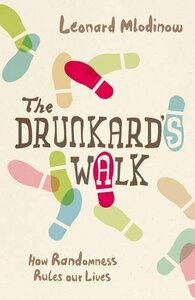You need to sign in or sign up before continuing.
Take a photo of a barcode or cover
I picked this book up on a whim on the off chance this might be a hidden gem within the psychology genre.
To my dismay, The Drunkard's Walk is more intellectually based (predominantly in mathematics and statistics) than I would have liked. Not that I wasn't able to follow the content, but I actually found some of the technical math enjoyable. Especially given Leonard's writing style makes seeing the nuts and bolts around the core ideas simple.
There are certainly some meaningful ideas presented in the book. Many concepts I resonated with, many that flew straight over my head.
My biggest takeaway is randomness and chance are everywhere across all areas of life. Where we humans struggle to comprehend it, and if we can understand, fail to accept or feel contentment in it.
I ultimately think my dissatisfaction with this book stems from a misjudgment of my expectations. Which is a tad ironic given my low expectations and how I picked up the book in the first place. But the more I read, the more my interest and intrigue began to pique. Only for it to unfortunately fall flat and not deliver.
The lack of 'psychological and human behaviour glue' to tie the concepts all together was what I was looking for.
My experience can be surmised as.
Ordering rump steak at a restaurant, being served eye fillet, then discovering the only utensils to eat it with is a spoon.
It's difficult to say how much a person might benefit from reading this book. A lot could be ascertained, or perhaps nothing at all.
It's not exactly an easy topic for someone to willingly walk into, but if you were to, Leonard Mlodinow's The Drunkard's Walk is a highly approachable read.
To my dismay, The Drunkard's Walk is more intellectually based (predominantly in mathematics and statistics) than I would have liked. Not that I wasn't able to follow the content, but I actually found some of the technical math enjoyable. Especially given Leonard's writing style makes seeing the nuts and bolts around the core ideas simple.
There are certainly some meaningful ideas presented in the book. Many concepts I resonated with, many that flew straight over my head.
My biggest takeaway is randomness and chance are everywhere across all areas of life. Where we humans struggle to comprehend it, and if we can understand, fail to accept or feel contentment in it.
I ultimately think my dissatisfaction with this book stems from a misjudgment of my expectations. Which is a tad ironic given my low expectations and how I picked up the book in the first place. But the more I read, the more my interest and intrigue began to pique. Only for it to unfortunately fall flat and not deliver.
The lack of 'psychological and human behaviour glue' to tie the concepts all together was what I was looking for.
My experience can be surmised as.
Ordering rump steak at a restaurant, being served eye fillet, then discovering the only utensils to eat it with is a spoon.
It's difficult to say how much a person might benefit from reading this book. A lot could be ascertained, or perhaps nothing at all.
It's not exactly an easy topic for someone to willingly walk into, but if you were to, Leonard Mlodinow's The Drunkard's Walk is a highly approachable read.
A decent introduction to probability and statistics with a few human interest stories about the mathematicians involved, just to add colour. The book is written in a pleasant, conversational style, and I really enjoyed the Shall We Dansu? reference. Oh, and a physically attractive book, with a really nice cover image and good texture.
Ultimately, I thought the book was trying to be too much for the space it had, and ended up being too little for any of the target audiences - not enough math for those interested in the science, and I'd suspect not enough human interest and/or business application for the rest of the readers. I'd've liked to have seen this book expanded, with greater depth in one direction or the other.
Ultimately, I thought the book was trying to be too much for the space it had, and ended up being too little for any of the target audiences - not enough math for those interested in the science, and I'd suspect not enough human interest and/or business application for the rest of the readers. I'd've liked to have seen this book expanded, with greater depth in one direction or the other.
The art of convincing someone that their view of the world is plain wrong is difficult; yet, in this book, Mlodinow executes it with perfection. It is one of those books which will take you on an "unlearning" journey. At times you might have that violent feeling of disagreeing with the author, but as you keep on flipping the pages, trust me, you'll be a convert.
interesting. i can't decide if the evidence and conclusions the author presents are encouraging, or just encourage apathy. but definitely an interesting read.
Questo è un libro potenzialmente molto interessante ma ho faticato non poco nei numerosi passaggi in cui l'autore affronta le varie casistiche da un punto di vista strettamente matematico e probabilistico. Ho apprezzato molto gli approfondimenti storici di vari fisici e matematici (per citarne alcuni: Cardano, Pascal, Newton), ma ritengo che La passeggiata dell'ubriaco richieda una consistente dose di concentrazione e un minimo interesse per il calcolo matematico... e io purtroppo manco soprattutto del secondo! Mi dispiace aver trovato meno approfondimenti di quelli che mi aspettavo su quanto la probabilità e il caso influenzino davvero la nostra vita di tutti i giorni, e probabilmente anche per questo non sono riuscita ad apprezzare appieno questo libro che al di là del mio giudizio, rimane comunque una lettura sicuramente molto interessante.
Non ci accorgiamo degli effetti della casualità sulla vita perché quando valutiamo il mondo tendiamo e vedere ciò che ci aspettiamo di vedere. Valutiamo il grado di talento mediante il successo, e poi rinforziamo questa impressione di causa/effetto osservando la correlazione. (p.245)
[…] Ma la cosa più importante che mi ha insegnato l'esperienza di mia madre è che dobbiamo riconoscere e apprezzare la fortuna che abbiamo, e individuare gli eventi casuali che contribuiscono al nostro successo. Mi ha insegnato anche ad accettare gli eventi fortuiti che possono provocarci dolore. Soprattutto mi ha insegnato ad apprezzare l'assenza di sfortuna, l'assenza di eventi che avrebbero potuto metterci in crisi, e l'assenza di malattie, guerre, carestie e di quegli incidenti che non ci sono (ancora) capitati. (p.252)
A quick read about probability, statistics, and randomness. Generally accessible and entertaining.
An engaging book on a fascinating topic that does possibly the best job I've seen explaining the unintuitive aspects of probability and statistics.
Mlodinow presents anecdotes and thought experiments from science, sports, academics, and numerous other sources, familiar and less familiar, to drive home the truth about probability. He also weaves in the history of thinking about probability and statistics, from Cicero to Cardano; Pascal to Bernoulli, and many others. As far as modern developments, the significant contributions of Kahneman and Tversky are covered, and the Monty Hall problem is discussed in detail, including the extreme reactions to Marilyn's column about it.
The explanation of Bayesian reasoning is as clear as any I've seen, which still doesn't mean that I have entirely grasped it. Mlodinow doesn't include complex math, instead appealing conversationally to logic using helpful examples.
Similar in many respects to Nate Silver's The Signal and the Noise, but I'm glad I read this one too; it's enjoyable and enlightening.
Mlodinow presents anecdotes and thought experiments from science, sports, academics, and numerous other sources, familiar and less familiar, to drive home the truth about probability. He also weaves in the history of thinking about probability and statistics, from Cicero to Cardano; Pascal to Bernoulli, and many others. As far as modern developments, the significant contributions of Kahneman and Tversky are covered, and the Monty Hall problem is discussed in detail, including the extreme reactions to Marilyn's column about it.
The explanation of Bayesian reasoning is as clear as any I've seen, which still doesn't mean that I have entirely grasped it. Mlodinow doesn't include complex math, instead appealing conversationally to logic using helpful examples.
Similar in many respects to Nate Silver's The Signal and the Noise, but I'm glad I read this one too; it's enjoyable and enlightening.
I already know too much about randomness from listening to all the physicists at work. This was too general for me.
I read this a long time ago, but to this day I adore Mlodinow's key takeaway. If randomness rules our lives, think of how you would consider everyone when you met them. You wouldn't judge them for their position in society. It's a really powerful message on compassion and freedom from judgment.
Млодинов - это соратник Хокинга, а в некоторых вопросах - его оппонент. Я склонен считать, что для учёного нет лучшего соратника, чем оппонент. Не радикальный, а такой... постоянно присутствующий критик на случай, если внутренний критик ушёл в отпуск.
Убил двух зайцев - повторил то, что я знаю о теории вероятности и статистике и дал себе строгий отчёт в том, что довольно далеко ушёл в сторону и от той, и от другой. Базовые понятия мне знакомы, основные когнитивные ошибки (включая упомянутый вчера в блогозаписи confirmation bias) мне понятны, простые задачки из области, связанные с комбинаторикой, тоже решаются, а вот углубиться уже тяжеловато.
Как некоторый мотиватор не останавливаться в том, что делаешь, книга тоже годится.
Убил двух зайцев - повторил то, что я знаю о теории вероятности и статистике и дал себе строгий отчёт в том, что довольно далеко ушёл в сторону и от той, и от другой. Базовые понятия мне знакомы, основные когнитивные ошибки (включая упомянутый вчера в блогозаписи confirmation bias) мне понятны, простые задачки из области, связанные с комбинаторикой, тоже решаются, а вот углубиться уже тяжеловато.
Как некоторый мотиватор не останавливаться в том, что делаешь, книга тоже годится.



